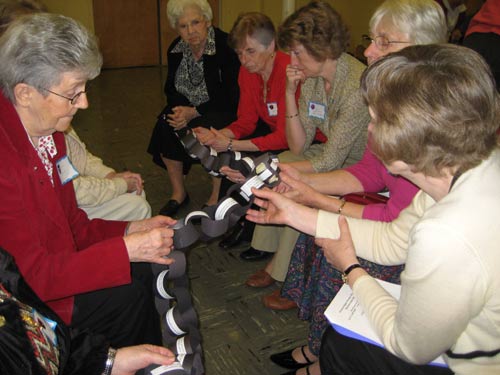
Approximately 800,000 to 900,000 victims annually are trafficked across international borders worldwide; between 18,000 and 20,000 of those victims are trafficked into the United States. The majority of those victims are women and girls. This is not a problem that solely occurs “over there,” but reports of sex trafficking are being increasingly received from even rural areas here in the United States. Big events such as the Super Bowl, Sturgis Motorcycle Rally, even political conventions see a rise in sex trafficking in the area where they’re held. Truck routes are corridors. Women living in poverty and teenage runaways are particularly vulnerable. The more we educate ourselves on this issue, the more we can take a stand for abolition.
Human Trafficking National Hotline: 1-888-373-7888 (TTY: 711)
Text: 233733
Website (with online chat): https://humantraffickinghotline.org/get-help
For Your Study
-
As educational piece on forced labor, view this video on Mica mining: https://youtu.be/PxjZXdwscpA.
-
Be the Change: Your Guide to Freeing Slaves and Changing the World, by Zach Hunter (Zondervan, reprint 2011). This book is particularly good for AB GIRLS/girls' groups as the book was written by a teenage abolitionist and activist, spending much of his time working to end modern-day slavery and fighting other problems in the world today. When he was twelve, he started a campaign called Loose Change to Loosen Change, helping to raise awareness and money to free people from slavery.
-
Start Here: Doing Hard Things Right Where You Are, by Alex & Brett Harris with Elisa Stanford (Multnomah Books, 2010). This isn't a book about human trafficking but, rather, about activism and engagement. It has inspired thousands of young people around the world to make the most of their teen years. The brothers are twins and wrote the book when they were 17 years old. One was a speaker at the 2012 National Gathering for Youth, sponsored by American Baptist Home Mission Societies, in Washington, D.C. This is recommended for AB GIRLS/girls' groups or youth groups.
-
The Road of Lost Innocence: The True Story of a Cambodian Heroine, by Somaly Mam with Rugh Marshall (Spiegel & Grau, 2005)
-
Made in the USA: The Sex Trafficking of America's Children, by Alisa Jordheim (HigherLife Publishing and Marketing, 2014)
-
A Crime So Monstrous: Face-to-Face with Modern-Day Slavery, by E. Benjamin Skinner (Free Press, 2009)
-
God in a Brothel: An Undercover Journey into Sex Trafficking and Rescue, by Daniel Walker (InterVarsity Press, 2011)
-
Sold, by Patricia McCormick (Hyperion Paperbacks, 2008)
-
The Natashas: The Horrific Inside Story of Slavery, Rape, and Murder in the Global Sex Trade, by Victor Malarek (Arcade Publishing, 2011).
-
Not for Sale: The Return of the Global Slave Trade—and How We Can Fight It, by David Batstone (HarperOne, 2010)
-
In Our Backyard: A Christian Perspective on Human Trafficking in the United States, by Nita Belles (Xulon Press, 2011). Also: In Our Backyard: Human Trafficking in America and What We Can Do to Stop It, by Nita Belles (Baker Books, 2015).
-
Half the Sky: Turning Oppression into Opportunity for Women Worldwide, by Nicholas Kristof and Sheryl WuDunn (Vintage, reprint edition 2014)
-
In Contempt of Fate, by Beatrice Fernando (BeaRo Publishing, 2004). This book is about labor trafficking.
Taking Action
-
Visit the website of the National Center on Sexual Exploitation for excellent information. http://endsexualexploitation.org/.
-
Participate in the Cities for CEDAW advocacy movement. The United States is one of only seven countries in the world that has not ratified the Convention on the Elimination of All Forms of Discrimination Against Women (CEDAW), which was adopted by the United Nations General Assembly in 1979. CEDAW is a landmark international agreement that affirms principles of fundamental human rights and equality for women around the world. In addition to eliminating discrimination against women in every sphere, it also addresses sex trafficking and domestic abuse. Tired of waiting for the United States to ratify CEDAW, the cities of San Francisco and Los Angeles passed ordinances in 1998 integrating CEDAW into city and county governance. Since then, similar initiatives have been enacted in other U.S. cities. Creating a groundswell of local, municipal support for this global human rights initiative will not only improve the lives of women in the U.S. but will significantly increase the possibilities of the U.S. ratifying CEDAW. To read a PDF document describing this intiative more fully, click here.
-
Type “sex trafficking [name of your area]” into your Internet search engine to find news stories, statistics, or programs addressing this issue near you.
-
Visit www.acf.hhs.gov/trafficking for information and “tool kits” that are available for free.